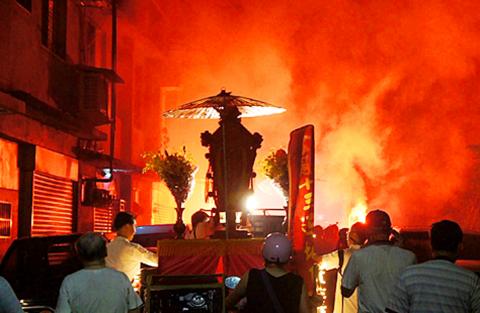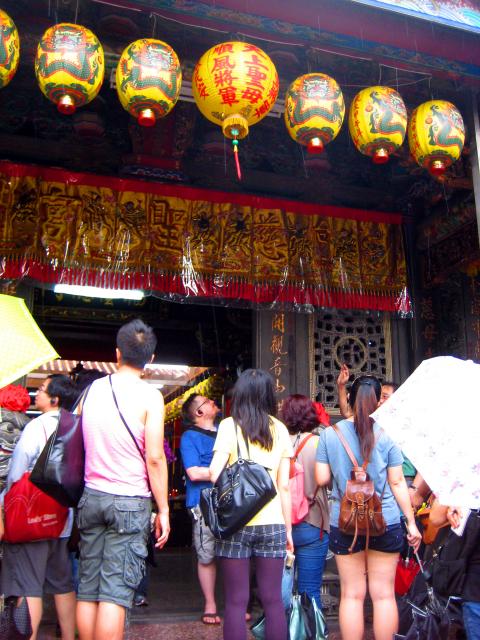In the midst of bustling Taipei lies a historical oasis where clusters of shops and homes are a reminder of what was once “the most important port in northern Taiwan.” What might be a little-known piece of history to non-Taiwanese is set to change with a series of walking tours introducing the region that is offered in English and Japanese.
The tours are held by Taipei Walking Tour in the Dadaocheng (大稻埕) and Dalongdong (大龍峒) districts, about 10 minutes north of Taipei Railway Station by car. Throughout May and June, a number of themed tours and workshops on topics such as Taiwan’s puppet culture, Xiahai City God Temple’s (霞海城隍廟) daytime and nighttime processions, and a roadside banquet on Dihua Street (迪化街) will be offered for NT$200 and NT$400. The tours and workshops are held mostly on the weekends leading up to the festival at Taipei Xiahai City God Temple, beginning on June 8.
In the past two years, veteran interpreter Joey Ho (何良正) has witnessed a growing interest among young people in Taiwan’s history.

Photo courtesy of Taipei Walking tour
“It could be the Internet that attracts young people to come and listen. Before, it seemed like young people weren’t interested in history. But through our efforts, they are starting to be concerned about this place, Taiwan’s history, its relics and old streets.”
With roughly 20 people following tour guide Johnny Cheng (程華生), the Dadaocheng heritage tour began with a stroll under the red arcade facade reminiscent of European architecture. Many of these former shops were built in the late 19th century, which coincided with Japanese occupation of Taiwan from 1895 to 1945. As a result of the marriage of European-Baroque, Japanese and Minnan (Southern Fujian) architectural styles, the buildings lining the streets are distinctly unique to Taiwan.
Prior to the tour, Kelly Hsiao (蕭凌雲) said she knew little about Dadaocheng’s history as a prosperous riverside town. Hsiao runs a hostel and was looking for recommendations to travelers other than the usual shopping and night market experience.

Photo: Jenny Peng
“When you visit Europe [and] stay in a hostel, they provide so many free tours or walking tours... [B]ut in Taiwan... we don’t have so many local activities to join for foreigners.”
Hsiao doesn’t know any other English-language walking tours available, and she thought it was “sad” that Taiwan’s history wasn’t easily accessible to non-Taiwanese.
One of the surprise stopovers was a tour led by a descendant of Lin Lan-tian (林藍田), one of Dadaocheng’s first settlers. Lin’s residence, built in the mid-1850s, is an example of Minnan architecture, designed for doing business. It’s unusually long depth is broken up into three sections. Supplies would arrive in the rear, while living corridors were in the middle and the front was a shop.
“It’s a legacy,” said Scott Lin (林宗志). “The spirit and wisdom of that legacy is something we’re trying to pass on to future generations.”
Although Scott Lin’s ancestors made a living selling mixed goods and offering fortune telling services, the shop has become a modern tea house, hinting at Dadaocheng’s past as a renowned tea processing center. Today, however, dried goods and Chinese herbal medicine are the two most common businesses in the neighborhood, according to Cheng.
The two-hour tour also included stopovers at Ci Sheng Temple (慈聖宮) and Xia Hai City God Temple.
Though attracting non-Taiwanese was the original goal of organizers, the majority of participants on Sunday were Taiwanese.
Yang Jei (楊乃傑) said he enjoyed the tour.
“I am Taiwanese, but I never knew this part of our history.”
For comprehensive information about the tours in Chinese, Japanese and English, visit: www.taipei-walkingtour.tw.

Google unveiled an artificial intelligence tool Wednesday that its scientists said would help unravel the mysteries of the human genome — and could one day lead to new treatments for diseases. The deep learning model AlphaGenome was hailed by outside researchers as a “breakthrough” that would let scientists study and even simulate the roots of difficult-to-treat genetic diseases. While the first complete map of the human genome in 2003 “gave us the book of life, reading it remained a challenge,” Pushmeet Kohli, vice president of research at Google DeepMind, told journalists. “We have the text,” he said, which is a sequence of

On a harsh winter afternoon last month, 2,000 protesters marched and chanted slogans such as “CCP out” and “Korea for Koreans” in Seoul’s popular Gangnam District. Participants — mostly students — wore caps printed with the Chinese characters for “exterminate communism” (滅共) and held banners reading “Heaven will destroy the Chinese Communist Party” (天滅中共). During the march, Park Jun-young, the leader of the protest organizer “Free University,” a conservative youth movement, who was on a hunger strike, collapsed after delivering a speech in sub-zero temperatures and was later hospitalized. Several protesters shaved their heads at the end of the demonstration. A

In August of 1949 American journalist Darrell Berrigan toured occupied Formosa and on Aug. 13 published “Should We Grab Formosa?” in the Saturday Evening Post. Berrigan, cataloguing the numerous horrors of corruption and looting the occupying Republic of China (ROC) was inflicting on the locals, advocated outright annexation of Taiwan by the US. He contended the islanders would welcome that. Berrigan also observed that the islanders were planning another revolt, and wrote of their “island nationalism.” The US position on Taiwan was well known there, and islanders, he said, had told him of US official statements that Taiwan had not

We have reached the point where, on any given day, it has become shocking if nothing shocking is happening in the news. This is especially true of Taiwan, which is in the crosshairs of the Chinese Communist Party (CCP), uniquely vulnerable to events happening in the US and Japan and where domestic politics has turned toxic and self-destructive. There are big forces at play far beyond our ability to control them. Feelings of helplessness are no joke and can lead to serious health issues. It should come as no surprise that a Strategic Market Research report is predicting a Compound